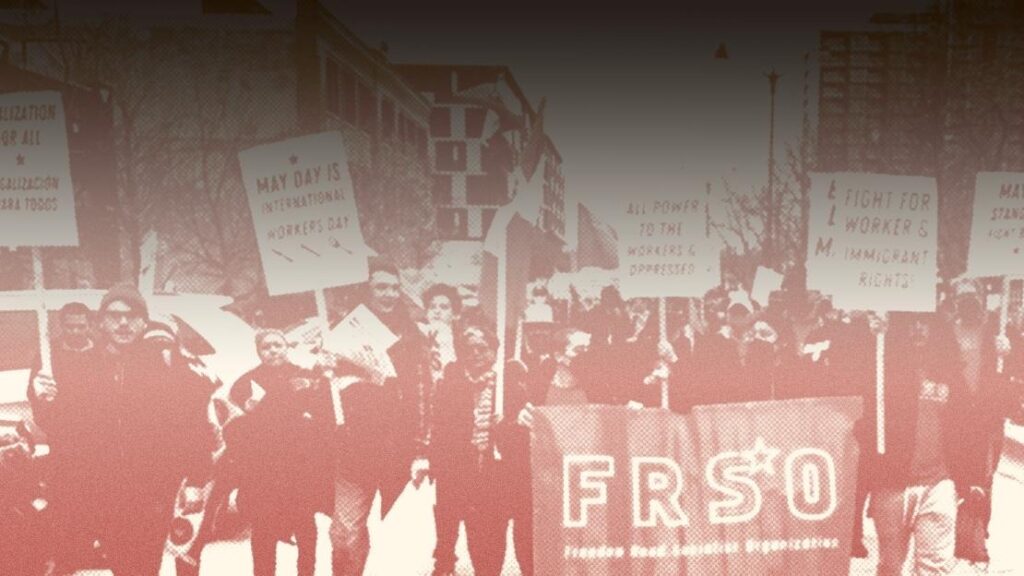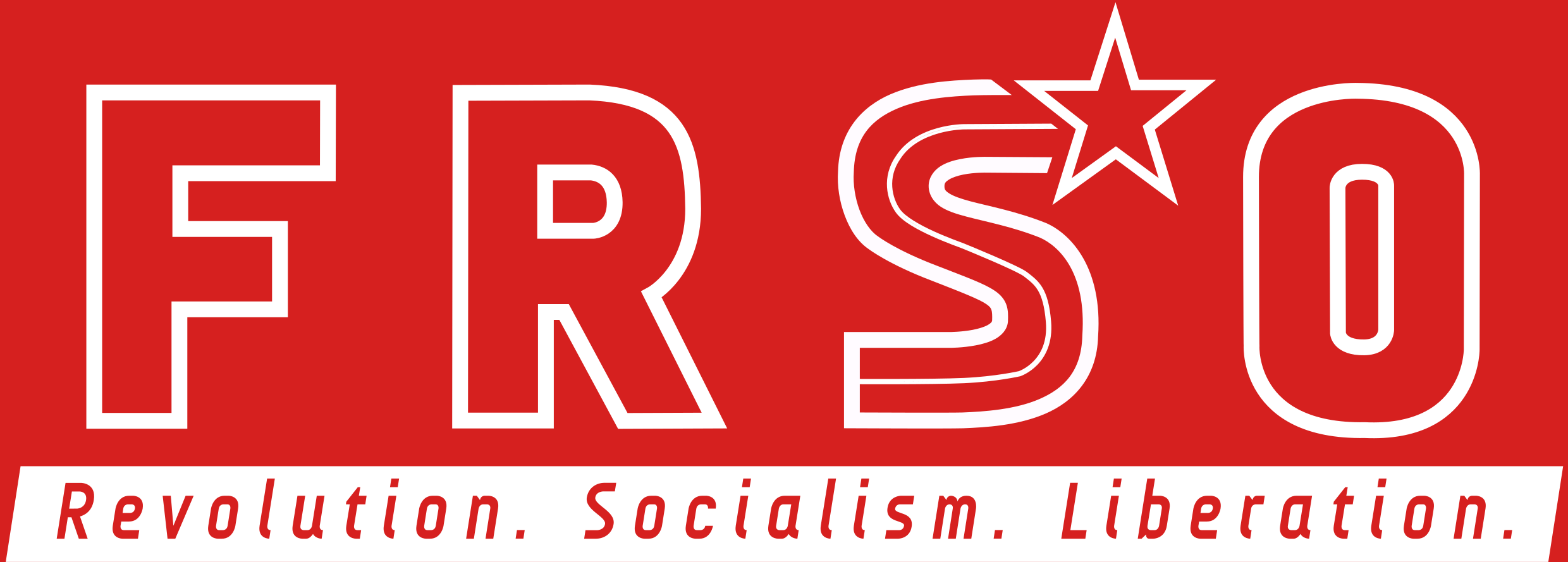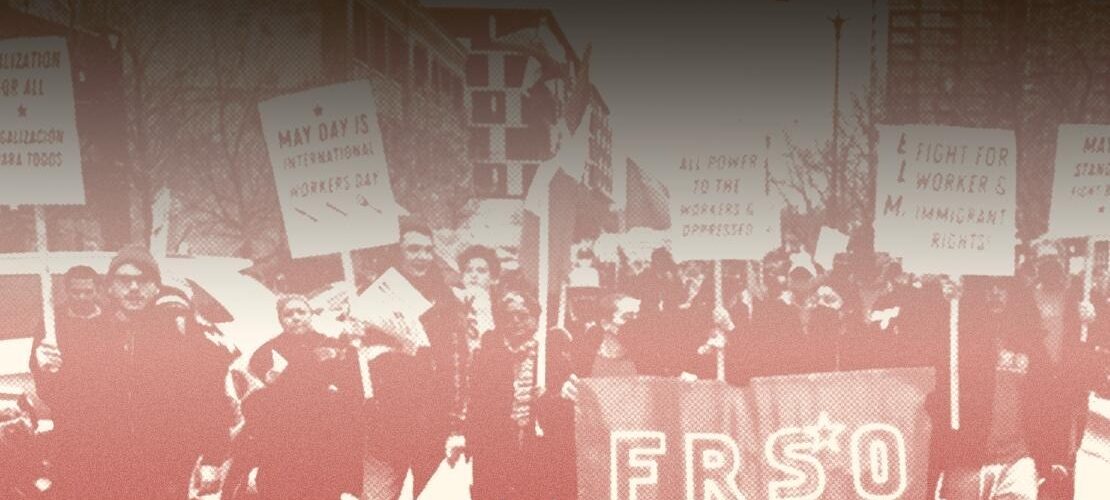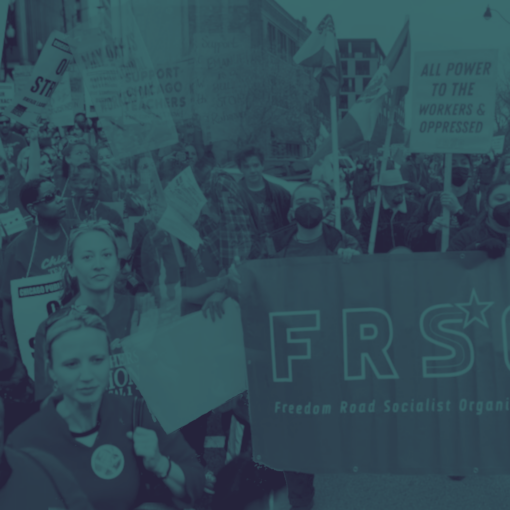
Download a full-page PDF version of our Program
Adopted at the 9th Congress of Freedom Road Socialist Organization in spring 2022.
The political program of Freedom Road Socialist Organization has grown out of a long process of waging struggle against the class enemy, building the people’s movements, and conducting study and analysis of the conditions we live under. The point of knowing the world is to change the world, and this program is a declaration of what this country’s working and oppressed peoples want and need, along with what it will take to get there.
Some parts of this program were written more than a decade ago. Others were adopted at our ninth congress in the spring of 2022. The program is a product of FRSO’s collective efforts at applying the science of revolution, Marxism-Leninism, to the day-to-day struggles we build and lead. We analyze the concrete conditions we are up against, while maintaining the long-term outlook of obtaining real change.
We are an organization of revolutionaries. Our members are African American, Chicano and Latino, white, Asian American, Arab American, and Native American. We are workers, students, and professionals—women and men, and LGBTQ. We are uniting the many to defeat the few.
Many of us are active in the labor movement, where we are going all out to strengthen our unions and make them effective in the class struggle. We are in the forefront of the fight against police crimes and the battle to end racist inequality. FRSO members build and contribute to the student, anti-war, and immigrant rights movements. We work actively to promote solidarity with the oppressed who are fighting for national and social liberation—from Palestine to the Philippines and points in between.
Freedom Road has a proud past. In the late 1960s and early 1970s, there was a tremendous upsurge in the struggles of African Americans, Chicanos, Asian Americans, and other oppressed nationalities. At the same time, a powerful student movement arose, which drew inspiration from the heroic struggle of the Vietnamese people, the resilience of socialism in China, and the revolutionary movements against colonialism and neocolonialism in Africa, Asia, and Latin America. The result was the creation of a powerful new communist movement. While this new movement of young communists had some real accomplishments, it lacked staying power. In 1985, some of the best elements of this great upsurge came together to create the Freedom Road Socialist Organization. Later we were joined by some members and leaders of the Communist Party USA, who shared our commitment to revolution and socialism.
Over the years we have faced challenges, from within and without. In the late 1980s and 1990s, a section of our leadership decided that they did not want to be revolutionaries, so they abandoned Marxism-Leninism and split from our organization. Later, in 2010, the Federal Bureau of Investigation (FBI) used the pretext of our anti-war and international solidarity work to launch a protracted campaign aimed at our destruction. We met these challenges, overcame adversity, and have grown. We appreciate the veteran revolutionaries in our ranks and are glad that most of our members are young.
Capitalism must go!
The U.S. is a land of contradiction and conflict. On the one hand, there is an accumulation of wealth into the hands of billionaires to a degree unknown in human history. The wealth of Jeff Bezos, Bill Gates, and Warren Buffet is equal to that of one-half of the U.S. population. On the other hand, most people in this country face a declining standard of living, expenses that are running ahead of wages, and the prospect of having nothing to pass down to the next generation. The masses of the homeless stand as an indictment of monopoly capitalism.
Capitalism is a shortsighted, unplanned system that has one aim: the achievement of the highest rate of profit, which in turn concentrates wealth into fewer and fewer hands. Systematic and ever-present inequality is a built-in feature of capitalism. The oppression of women, the inequality faced by oppressed nationalities, and class exploitation, extend into the foundations of capitalism. Nothing about this society is just or fair.
Advances in science and technology that could serve to improve our lives, instead are a source of misery and a means to forge new, more deadly weapons of war. Automation that could make our work lives better or improve our livelihood becomes a source of unemployment and instability that devastates entire communities. We have a for-profit healthcare system that excels at making money for pharmaceutical companies and other big corporations, while failing the rest of us. Even public education is under attack by privatizers out to make a buck.
Capitalism gives rise to alienation, hopelessness, crime, and corruption. Police and the criminal injustice system are unable to keep us safe. In fact, they are guardians of oppression and defenders of the existing order of things. The U.S. imprisons more people than any other country on earth. This mass incarceration is the product of a system that has forfeited its right to exist. U.S. culture glorifies greed, selfishness, and brutality—a harrowing reflection and a means to reinforce capitalism’s ugly reality. The U.S. military has hundreds of bases around the world, waging war on countries, nations, and peoples who want freedom from the U.S. Empire.
This system of exploitation and injustice cannot be reformed out of existence. We want better lives—so we fight for exactly that. Every step of the way we try to win everything that can be won, raise the level of struggle, and organize our collective movement. But we are also doing something else: we are building an organization of revolutionaries to bring this monster down. The capitalists give with an eye dropper and take with an earth mover. We cannot reform our way to a better way of life. We need to take the sledgehammer of revolution to the chains of oppression.
The monopoly capitalists, the ruling class, have every interest in keeping things the way they are. They benefit from low wages, unemployment, and every kind of inequality. What is good for them, is bad for us, so we have nothing in common with the billionaires. In fact, there is not a single issue on which we can find common ground. Not one. For example, take climate change. Corporations benefit from destroying the environment—that is why they always push back against environmental protections, going so far as hiring scientists and politicians to say that climate change is a hoax. They are very willing to destroy the planet in order to make as much money as possible, as quickly as possible—they will do anything for their bottom line. It is us or them.
So, our class needs to take power by revolutionary means. We need socialism, where the commanding heights of society are occupied by the working class, placing all political and economic power in our hands.
Proud history, bright future
The history of the U.S. is a history of class struggle, of epic battles that shine a spotlight on the criminality of the class that rules, while demonstrating the great capacity and potential for resistance on the part of this country’s working and oppressed people.
The outstanding Russian communist V.I. Lenin stated that the American Revolution of 1776 was a “great war of liberation” that was part of the era’s wave of progressive democratic struggles against the landholding autocracy and feudal reaction that dominated Europe. At the time, capitalism was a relatively young system that played a progressive role in developing the productive forces, while breaking down the stagnant societies dominated by feudal kings and lords.
From its onset, capitalism in the U.S. was based on genocide, directed against the Native peoples, and fueled by slavery. A large section of the people were locked in indentured servitude and women were disenfranchised. Despite the deep and real democratic aspirations of the times, the cry of “Liberty and Justice for All” rang hollow for most. In practice, it was liberty for a relative handful of wealthy white men to rule over the vast majority of the people. The result was struggle. Native peoples waged wars of resistance. Slaves launched repeated and heroic rebellions. There were constant attempts by working people, in the cities and on the farms, to fight for their own interests.
The rapid development of competitive capitalism on the eastern seaboard gave rise to one the world’s first trade union movements. It was also accompanied by the genocidal westward expansion of one country that had two different social systems: one in the North, based on wage labor and small farms, and the other in the South, based on slavery on big plantations. In 1846, the U.S. launched a war that resulted in the theft of northern Mexico and the extension of slavery into Texas. A result was the development of the Chicano nation. Located in what is now the U.S. Southwest, the Chicano people were robbed of their land, denied equal rights, including the right to equality of languages, and faced brutal national oppression. The Chicano nation has always resisted. This powerful record of struggle is a bright point in U.S. history.
The Civil War was the product of the irrepressible conflict between Northern capitalism and the slavocracy. The defeat of the Southern slave system was a second revolution, ushering into being one of the most profoundly liberating episodes in U.S. history, Black Reconstruction, which challenged the power of the planter class, implemented voting rights, public education, and so much more. In 1877, the Northern capitalists withdrew federal troops from the South, abandoning the Reconstruction governments to a tide of terror launched by the white planter class. The result was the forging of an African American nation in the Black Belt South that was denied economic and political power. The federal troops departing the South were then used against the great railway strikes for the 8-hour day in the North. The end of slavery paved the way for a more rapid expansion of capitalism and gave rise to great battles between labor and capital.
The militancy displayed by the U.S. labor movement and the viciousness of the U.S. employing class is known around the world. Before the First Word War, miners in the western part of the U.S. waged powerful strikes and engaged in armed combat. In the 1930s, the great sit-down strikes, and workplace takeovers inspired workers across the globe. The two main holidays of the international working class, May Day and International Women’s Day, were born right here in the U.S.
The U.S. Civil War sowed the seeds of monopoly. After the Civil War, competitive capitalism gave rise to robber barons and gigantic trusts. By the late 1890s, U.S. monopoly capitalism had arrived on the world stage, seizing Hawaii, fighting a war with Spain for colonies, including Puerto Rico, and embarking on the road to world domination, with an empire extending across Africa, Latin America, the Middle East, and Asia. Following the First World War, the U.S. emerged as the strongest of the imperialist powers.
After World War Two, the rulers of the U.S. proclaimed the “American Century.” However, the combined might of the national liberation movements, the socialist countries, and the struggles here at home, coupled with monopoly capitalism’s limitations, brought an early end to the “American Century.” By the early 1970s, U.S. monopoly capitalism entered a period of stagnation and decline.
The people of the U.S. have never peacefully submitted to our oppressors. Be it the pitched battles waged by women textile workers, Chicano miners, African American sharecroppers, or Asian American farmworkers, the history of the U.S. is a history of struggle. The massive labor battles of the 1930s, the Civil Rights movement and the Black rebellions, the anti-war movement of the 1960s and 1970s, and events like the Chicano Moratorium and the Stonewall Rebellion are some of the many high points that show what working and oppressed peoples can do. It is a rich legacy for all who want change.
The decline of monopoly capitalism is accelerating. The Trump presidency and his attempt to retain power on January 6, 2021, show the fragility of the political system. The great rebellion following the murder of George Floyd shows that this country is ripe for the development of a revolutionary movement. It is in this spirit that we are publishing additional sections of the FRSO program. We are naming an enemy and proposing solutions. We are making every effort to build a new, revolutionary, communist party that is capable of contending for power. We are not there yet, and there is a lot more hard work to be done to get there. The road ahead may be difficult, but the future is certainly bright.



